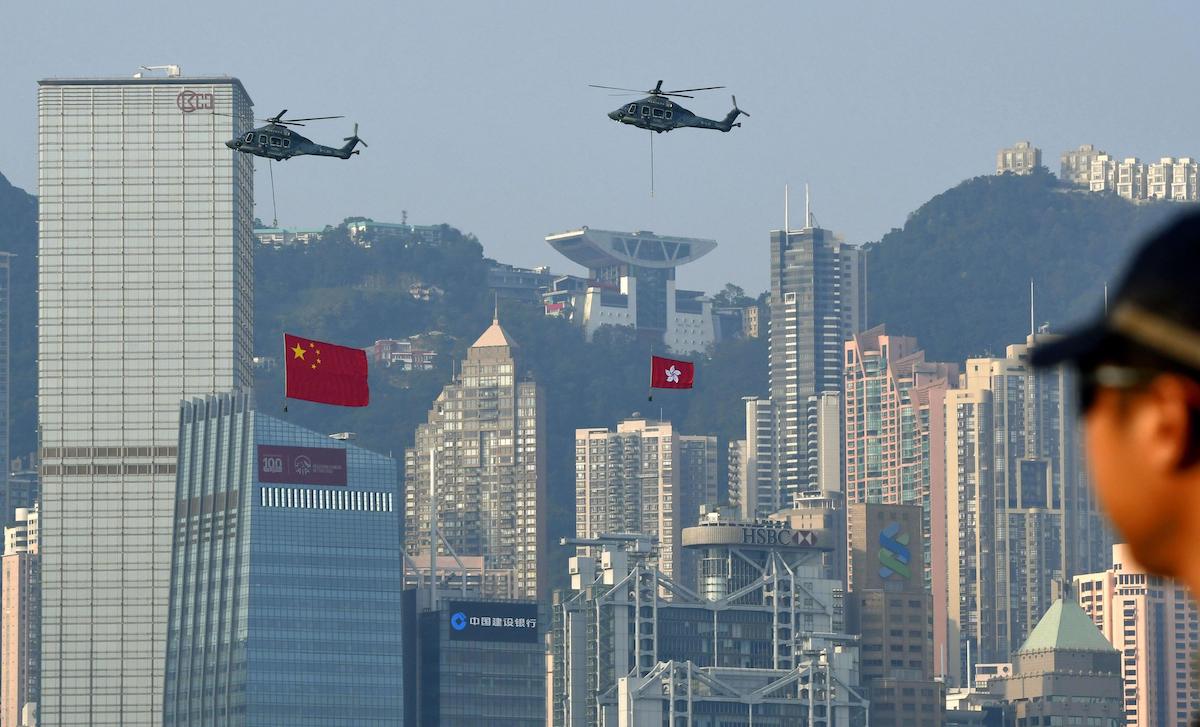Hong Kong has become the face of China’s dictatorship, the most dramatic evidence of Xi Jinping’s determination to extinguish even the hint of dissent among his people. Today residents of the Special Administrative Region are ruled as completely and cruelly by the Chinese Communist Party as are those living in Beijing or Shanghai.
Yet paranoia afflicts regime apparatchiks, who recently targeted chocolate as a threat to public order. In a story befitting The Onion, The New York Times reported: “The city’s top security official, Chris Tang, said last week that some people in Hong Kong prisons were accumulating chocolates and hair clips—items allowed in limited numbers—to ‘build power’ and ‘solicit followers,’ with the possible goal of undermining the government. ‘Many people may find it strange—they just have a few more hair clips, one more piece of chocolate, what’s the problem?’ he told reporters. Then he continued, ‘They make other people in jail feel their influence, and from there feel even more hate for the Hong Kong and central governments, and from there endanger national security.’”
Subsequently, the authorities launched a raid on a warehouse where an activist group was storing materials, including M&Ms, for distribution to prisoners. Three people were charged with inciting “subversion.” Reported Nikkei Asia: “Steve Li, senior superintendent of the police national security bureau, told reporters the trio aimed at fomenting ‘war’ or ‘revolution’ against the governments of Hong Kong and China.” It turns out that Hong Kong’s petty despots are loons as well as thugs.
Hong Kong’s birth reflected the tumultuous collapse of Imperial China. The territory was seized by the United Kingdom in the so-called Opium Wars, with most of the land denominated a “lease.” Its expiration led to negotiations that culminated in the 1997 return of Hong Kong to what was then the People’s Republic of China (PRC). Beijing promised to preserve Hong Kong’s autonomy for 50 years, but there was no enforcement mechanism.
For nearly two decades, China appeared to keep its bargain, delegating supervision to local authorities chosen through an electoral process that nevertheless guaranteed Beijing’s control. However, a decade ago a new general secretary took over the Chinese Communist Party. He eventually focused his determination to strengthen party and personal control on Hong Kong. Democracy advocates demanded what the CCP could never give, democracy, and created what the CCP could never accept, chaos. The PRC won the inevitable confrontation.
Instead of a reprise of the bloody crackdown in Tiananmen Square (and beyond), Xi and his minions adopted a form of ruthless minimalism, the National Security Law (NSL). Beijing’s factotum, Chief Executive Carrie Lam, even promised that “the law will not affect Hong Kong’s renowned judicial independence. It will not affect legitimate rights and freedoms of individuals that are protected under the Basic Law and the relevant provisions of international covenants as applied to Hong Kong.”
Experience soon demonstrated otherwise. The genius of the measure was its ambiguity. Stanley Ng, a CCP minion serving in China’s rubberstamp National People’s Congress, admitted that Beijing left the measure indeterminate to enhance the “real effects of intimidation and deterrence.” The NSL prohibited collusion, separatism, subversion, and terrorism, all broadly defined. Thus, criticizing the government can be held “to endanger national security” in multiple ways.
And conviction is guaranteed. The Beijing authorities set the law’s interpretation, sent security personnel to Hong Kong to enforce the law, and provided special judges to hear national security cases. The measure even applies to activities overseas and to foreigners. Having criticized the PRC in Washington, President Joe Biden could be arrested if he visits China or Hong Kong.
The NSL came into effect on June 30, 2020, and began transforming virtually every aspect of Hong Kong society. Receiving particularly malign attention by the authorities were educational institutions, from elementary school to university; the media, from government-funded operations to private newspapers; protests, mostly banned in the name of combating COVID-19; free expression, including speech, print, online communications, banners, and art; and political opposition, with critics of the Hong Kong and Beijing authorities barred from office. The city even set up a hotline for snitches to report their neighbors.
As of June 2021, roughly 130 people had been arrested under the law. The first conviction occurred in July. The defendant waved a “Liberate Hong Kong, Revolution of Our Times” banner and ran into police on his motorcycle; on the first count he received a sentence of six and a half years. The court ruled that “liberate” meant secession, which violated the law. Warned Professor Surya Deva of City University of Hong Kong: “Anything could be argued by the government as being capable of having that meaning of inciting secession.” And this case is just the start. The New York Times observed that it is “in some ways, a preview of how the courts may consider a slew of national security cases centering on peaceful protest and free expression that are set to follow.”
The second conviction was reached in October, with sentencing to come. It was a pure free speech case in which the “crime” was shouting pro-independence slogans. Stated the judge: “The defendant has constantly and unreservedly incited things that are forbidden under the national security law.” The regime is attempting “to stamp out certain forms of speech,” argued Kellogg, by bringing “serious charges against people who say things that the government doesn’t like.”
The authorities continue to extend the law’s reach. At the end of October, the Legislative Council, from which all democratic activists have been excluded, voted to censor films. Reported Reuters: “The Hong Kong government said the film censorship law was aimed at content deemed to ‘endorse, support, glorify, encourage and incite activities that might endanger national security,’” which means anything failing to exhibit sufficient obeisance to Beijing.
In September, members of the Hong Kong Alliance in Support of Patriotic Democratic Movements in China, which organized an annual Tiananmen Square vigil, were charged under the NSL. The group subsequently disbanded. Its Tiananmen Massacre Museum was raided—with exhibits confiscated and website access limited. Hong Kong University removed the “Pillar of Shame” sculpture, on permanent loan from the Alliance.
Amnesty International announced it was closing its local and regional offices by the end of the year; Human Rights Watch had already left. The Hong Kong Confederation of Trade Unions voted to disband. The Hong Kong Professional Teachers Union also said it planned to dissolve. Reported The New York Times: “Activist groups have also been decimated. The Civil Human Rights Front, which had organized large marches, closed in August after Beijing’s office in Hong Kong accused it of opposing China and the police opened an investigation into its funding.”
Brian Wong of the independent research group Liber Research Community said it was not interested in politics, “but from what we can see on the mainland, eventually all of civil society can be seen as a threat.” The Hong Kong Journalists Association continues to resist. However, association chairman Ronson Chan told the Times: “Honestly, it’s a gamble. How cruelly will the Beijing government treat us? We know the history of journalists in the People’s Republic of China.”
According to the Hong Kong Free Press, the public broadcaster RTHK has gone all in with the new communist order after hiring “a new Director of Broadcasting with no previous media experience at the helm in March. Since then, RTHK has also scrubbed its online archives, purged and restricted its Twitter account, launched a chat show hosted by Chief Executive Carrie Lam, and issued directives to staff to use Beijing-approved wording.”
A “patriots only” government was created by ousting any legislator even at the district level not under Beijing’s control, after elections two years ago delivered an overwhelming anti-PRC majority. By August, reported The New York Times: “More than half of the council members from the pro-democracy camp, over 250 of them, have quit in recent weeks to avoid being ensnared in Beijing’s campaign. Those who remain are worried about being arrested.” Having rendered the upcoming contests meaningless, the Hong Kong authorities then threatened the opposition parties for not fielding candidates.
In sum, the National Security Law fulfilled its purpose to intimidate, thereby making possible the sort of full-scale oppression characteristic of the mainland. Xi Jinping and the CCP have destroyed Hong Kong as an intellectually free society.
Alas, they are not yet finished. In October, Lam announced plans for a new “megacourt” to handle thousands of cases for such offenses as unlawful assembly and flag desecration dating back two years. According to the Guardian: “She also outlined plans to continue tightening security in Hong Kong … bringing in a ‘fake news’ law, increasing national security education in schools, introducing programmes to help young people ‘develop positive thinking and law‑abiding awareness,’ and expanding mandatory oath-taking for public servants.”
What Lam has been unable to control, however, is the ongoing human exodus. In 2020, Hong Kong’s population dropped by 1.2 percent, the largest reduction since the 1960s, when records were first kept. Many people are determined to raise children without indoctrination, or “patriotic education,” as the CCP calls it. Immigration consultant John Hu said the NSL’s passage boosted demand for his services, particularly from families with kids: “They prefer their children to have more freedom of speech and to have more balanced education.” Hong Kong schools have lost students and consolidated classes as a result.
The light of freedom is going out in Hong Kong. However, history has not ended. Americans and others of goodwill can do little today to influence Beijing, but they can offer the people of Hong Kong refuge and promote the continued free flow of information. And, ultimately, hope for China’s rebirth.

